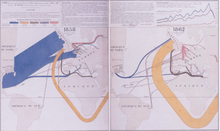
… the Union can grow powerful only by fostering the manufacturing interest. This, Sir, I think the true American political economy. ~ Friedrich List, Outlines of American Political Economy (1827)

It has been said, and perhaps with truth, that the conclusions of Political Economy partake more of the certainty of the stricter sciences than those of most of the other branches of human knowledge. ~ Thomas Malthus, Principles of Political Economy

The opinions that the price of commodities depends solely on the proportion of supply and demand, or demand to supply, has become almost an axiom in political economy, and has been the source of much error in that science. ~ David Ricardo, The Principles of Political Economy and Taxation
Political economy was the original term used for studying production and trade, and their relations with law, custom, and government, as well as with the distribution of national income and wealth. Political economy originated in moral philosophy. It was developed in the 18th century as the study of the economies of states, or polities, hence the term political economy.
Quotes
- Quotes are arranged alphabetically by author
A - F
G - L
- As there are so many who talk prose without knowing it, or, again, who syllogize without having the least idea what a syllogism is, so economists have long been mathematicians without being aware of the fact.
- William Stanley Jevons, The Theory of Political Economy (1871). Preface To The Second Edition, p. 14
- … the Union can grow powerful only by fostering the manufacturing interest. This, Sir, I think the true American political economy.
- Friedrich List, Outlines of American Political Economy (1827), Letter IV
M - R
- It has been said, and perhaps with truth, that the conclusions of Political Economy partake more of the certainty of the stricter sciences than those of most of the other branches of human knowledge.
- Thomas Malthus, Principles of Political Economy (Second Edition 1836) Book I, Introduction, p. 1
- If there is one well-established truth in political economy, it is this:
- That in all cases, for all commodities that serve to provide for the tangible or intangible needs of the consumer, it is in the consumer’s best interest that labor and trade remain free, because the freedom of labor and of trade have as their necessary and permanent result the maximum reduction of price.
- ... Whence it follows:
- That no government should have the right to prevent another government from going into competition with it, or to require consumers of security to come exclusively to it for this commodity.
- Gustave de Molinari, The Production of Security (1849/1977), p. 3
- Assume that the new elite were clearly and simply to proclaim its intentions which are to supplant the old elite; no one would come to its assistance, it would be defeated before having fought a battle. On the contrary, it appears to be asking nothing for itself, well knowing that without asking anything in advance it will obtain what it wants as a consequence of its victory.
- Vilfredo Pareto, Manual of Political Economy, page 92
- The opinions that the price of commodities depends solely on the proportion of supply and demand, or demand to supply, has become almost an axiom in political economy, and has been the source of much error in that science.
- David Ricardo, The Principles of Political Economy and Taxation (1821) (Third Edition) Chapter XXX, Influence of Demand and Supply, p. 260
- The whole Marxian system springs from classical political economy as it found expression in Ricardo.
- Eric Roll, A History of Economic Thought (1939), Chapter IV, The Classical System, p. 193
- David Ricardo is without doubt the greatest representative of classical political economy. He carried his work begun by Smith to the farthest point possible without choosing one or the other of the roads which led out of the contradiction inherent in it.
- Eric Roll, A History Of Economic Thought, Chapter IV, p. 176
S - Z
- Political economy has only become a science since it has been confined to the results of inductive investigation.
- Jean-Baptiste Say, A Treatise On Political Economy (Fourth Edition) (1832), Introduction, p. xxvi
- If we engraft the current meaning of the word "economy" (the avoiding of waste) upon its etymological meaning (the administration of a household), we shall arrive at "the administration of the affairs and resources of a household in such a manner as to avoid waste and secure efficiency" as our conception of "Economy." "Political" Economy would, by analogy, indicate the administration, in the like manner, of the affairs and resources of a State, regarded as an extended household or community, and regulated by a central authority; and the study of Political Economy would be the study of the principles on which the resources of a community should be so regulated and administered as to secure the communal ends without waste.
- Philip Wicksteed, "Introductory: Administration of Resources and Choice Between Alternatives. Price and the Relative Scale," ch. 1 of The Common Sense of Political Economy, Book I, Systematic and Constructive, contained in ed. Lionel Robbins, The Common Sense of Political Economy and Selected Papers and Reviews on Economic Theory by Philip Wicksteed vol. I (London: Routledge & Kegan Paul LTD, 1933, 1957), p. 14.
See also
External links
This article is issued from
Wikiquote.
The text is licensed under Creative
Commons - Attribution - Sharealike.
Additional terms may apply for the media files.